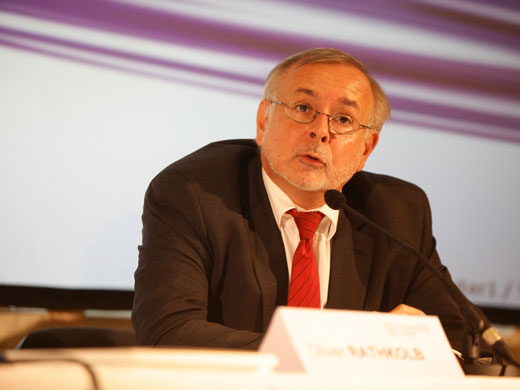
Oliver Rathkolb
Chairperson, Academic Committee, House of European History, Brussels
Prof. em. DDr., historian and lawyer Oliver Rathkolb (* 1955 in Vienna)
Professor of Modern History with a special focus on contemporary history (2008-2024) at the Institute of Contemporary History at the University of Vienna; Chairman of the Academic Committee, House of European History, Brussels; Member of the Advisory Board, Salzburg Festival Archive; Former Chairman, Academic Advisory Board of the House of Austrian History (2015-2022)
Editor of the specialist journal “zeitgeschichte” for many years. His numerous awards include the Danubius Donauland Non-Fiction Prize in 2005 and the Bruno Kreisky Prize for the political book in the year of the same name (Die paradoxe Republik. Österreich 1945-2005, Zsolnay Verlag). This was followed by the City of Vienna Prize for the Humanities in 2012, the Golden Medal of Honor of the Province of Vienna in 2015 and the Grand Decoration of Honor in Silver for Services to the Republic of Austria in 2016.
He was also chairman of the jury of the Theodor Körner Prize for Science and Art, member of the international scientific advisory board of the House of European History, European Parliament/Brussels and the Jewish Museum Vienna, chairman of the international scientific advisory board of the House of Austrian History.
Since 2022, he has been Chairman of the Vienna Institute for Cultural and Contemporary History (VICCA).
Research and publication activities:
8 monographs (1 in English), editor of 7 anthologies (4 in English), co-editor of 32 anthologies (3 in English, 2 in Czech); some 200 scientific contributions in Austrian and international specialised papers as well as anthologies.
Main areas of research and publication
12 monographs (in several languages), editor of 7 edited volumes (4 in English), co-editor of 40 edited volumes (3 in English, 2 in Czech); approx. 200 scientific contributions in national and international specialist journals and anthologies.
European history in the 20th century, Austrian and international contemporary and present-day history in the field of political history, Austrian republican history in a European context, as well as international relations European context, as well as international relations, the history of Nazi perceptions, cultural and media history media history, economic history (industry and banking), National Socialism and legal history.
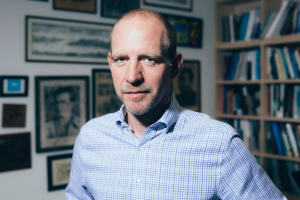
Florian Bieber
Professor of Southeast European History and Politics at the Center for Southeast European Studies at the University of Graz
Florian Bieber is a political scientist and historian working on inter-ethnic relations, ethnic conflict and nationalism, focusing on Southeastern Europe. He is a Professor in South East European History and Politics and director of the Center for South East European Studies at the University of Graz. He coordinates the Balkans in Europe Policy Advisory Group and is President of the Association for the Study of Nationalities. He held the Jean Monnet Chair on the Europeanisation of Southeastern Europe from 2019 to 2023.
He is also a Visiting Professor at the Nationalism Studies Program at Central European University and is the editor of the book series Southeast European Studies, published with Routledge (formerly Ashgate).
His work includes expert advice on minorities and minority rights for the European Commission, the OSCE, and the Council of Europe and has provided advice to governments and international organizations on the Balkans. He has extensive training experience in the field of diversity and minority rights.
He is the Honorary Consul of the Grand Duchy of Luxembourg in Graz and a member of the European Academy of Sciences and Arts.
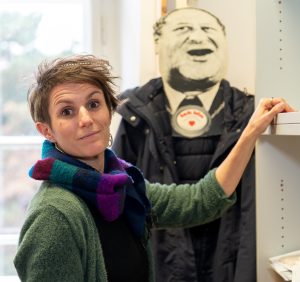
Lucile Dreydemi
Professor of Contemporary History (Austrian contemporary history since 1918 in an international context)
Lucile Dreidemy is a historian and Germanist and has held the professorship for Austrian Contemporary History since 1918 in an International Context at the University of Vienna since October 1, 2024.
She was previously Associate Professor (Maître de conférences) for German Studies at the Université Toulouse II since 2014 and also worked as a Post-Doc Assistant (until March 1, 2023) and then as a Senior Lecturer at the Institute of Contemporary History at the University of Vienna since 2019.
In 2024, she habilitated with a thesis on “International Politics without State Actors? The Vienna Institute for Development Studies and the Social Democratic North-South Networks in the Global Cold War”.
Lucile Dreidemy has taught and researched at several other international universities, including as a Visiting Scholar at the History Department of the University of Chicago in 2013 and at the Center for European Studies at Harvard University in 2018-19. She is a member of the editorial board of the journals zeitgeschichte and Austriaca and co-initiator and coordinator of the Forschungsgruppe New Cold War Studies at the University of Vienna.
Since 2023, she has also been a member of the Works Council for Academic Staff at the University of Vienna.
Current editing project: Lucile Dreidemy/Johannes Knierzinger/David Mayer/Clemens Pfeffer (Hg.): Stimmen des Antikolonialismus. Eine globalhistorische Spurensammlung 1615-1917, Wien: Mandelbaum 2025.

Oliver Gruber
Private lecturer at the Institute of Political Science at the University of Vienna
Priv.-Doz. MMag. Dr. Oliver Gruber (* 1981 in Vienna) is a habilitated private lecturer at the Institute of Political Science at the University of Vienna, a senior lecturer at the University of Applied Sciences BFI Vienna and a scientific expert at the Vienna Chamber of Labor. He is also a member of the board of the Institute for Conflict Research and a member of the board of trustees of the Austrian Language Diploma (ÖSD). In addition to the University of Vienna as his alma mater, his research and teaching positions include the Austrian Academy of Sciences, the Università de Studi di Pavia, Queen Mary University London and the University of Innsbruck.
His research and teaching as a political scientist and social scientist focuses on the Austrian political system, political parties and party competition, populism and nationalism as well as the political fields of migration/integration research, language policy and multilingualism, education policy and education research. He acts as a reviewer, editor and author for internationally renowned publishers (including Palgrave, Springer, Oxford University Press) and journals (such as the Journal of Contemporary European Studies, Policy Studies, British Politics, Journal of Ethnic and Migration Studies) as well as numerous Austrian publishers and journals.
More information on his academic work can be found on his website: olivergruber.at
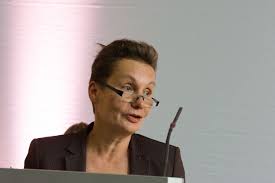
Maria Mesner
Head of the Bruno Kreisky and the Johanna Dohnal Archives
Maria Mesner heads the Bruno Kreisky and the Johanna Dohnal Archives, she teaches at the Department of Contemporary History at the University of Vienna and is co-editor of „Austrian Journal of Historical Studies“. Her main research focus is on 20th century political culture in comparative perspective, gender history and the history of the body.
She is Study Program Director of History, deputy head of the Department of Contemporary History and Head of the Gender Research Office at the University of Vienna.
She coordinated numerous research projects, for example on the De-Nazification of the Social Democratic Party of Austria. Currently she is working on economic and social crises of the 1970s and 1980s in Austria. She received national and international awards and grants, for example the Käthe-Leichter-Award for Women’s and Gender Studies, endowed by the Austrian National Bank, and a Fulbright Research and Teaching Grant at the History Department at New York University in 2007.
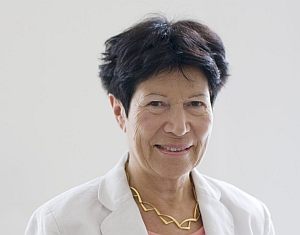
Helga Nowotny
Former Chair of the European Research Advisory Board
Prof. Dr. Helga Nowotny (* 1937 in Vienna) is an internationally recognized scientific researcher and professor emerita of ETH Zurich.
She was a founding member and Vice President of the European Research Council (ERC), established in 2007, and its President from 2010 to 2013.
She is currently Chair of the ERA Council Forum Austria and a member of the Austrian Council for Research and Technology Development.
After having completed her Law studies, she worked as Assistant Professor at the Institute of Criminology before moving to New York, where she studied under Paul F. Lazarsfeld and earned her Ph.D. in Sociology from Columbia University.
Back in Vienna, she headed the Department of Sociology at the Institute for Advanced Studies. She then completed a sabbatical at King’s College Cambridge, taught and received a post-doctoral lecturing qualification in Sociology with a focus on Science Studies at the University of Bielefeld. She was Founding Director of the European Centre in Vienna before joining the newly established Wissenschaftskolleg zu Berlin in 1981/82 as Fellow of the First Year group.
Before being appointed to ETH Zurich in 1995, Helga Nowotny was professor and head of the Institute for Theory and Science Studies at the University of Vienna, founded in 1986. At ETH Zurich, she headed the interdisciplinary Collegium Helveticum in addition to her professorship in Philosophy and Social Studies of Science.
In 2018, Nowotny was awarded the Leibniz Medal of the Berlin-Brandenburg Academy of Sciences and Humanities.

Sigrid Stagl
Head of the Institute for Ecological Economics and Director of the Competence Center for Sustainability Transformation and Responsibility at WU Vienna
Univ.Prof. Dr.in Sigrid Stagl is an economist with research interests in sustainable work, ecological macroeconomics, integrated valuation methods and socio-economic theory of action; empirical focus on energy and food.
Since 2008 full professor at the Department of Socioeconomics at WU.
Prior to that, Sigrid Stagl researched and taught at the University of Leeds and University of Sussex (2001-2009).
After graduating from WU Vienna, she completed her PhD studies at the Department of Economics at Rensselaer Polytechnic Institute, Troy, New York, where she was awarded the world’s first PhD in Ecological Economics.
For more than a decade she was active (as Board Member, Vize-President and President) in the governance of the European Society for Ecological Economics (ESEE).
At WU she founded the Institute for Ecological Economics and co-founded the Research Institute Economics of Inequality.
She is currently Head of the Institute for Ecological Economics and Director of the Competence Center for Sustainability Transformation and Responsibility at WU Vienna.
From 2020 to 2024 she was a member of the Supervisory Board of the Austrian Post AG. Since 2023 she has been a member of the General Council of the Austrian National Bank. Since 2025 she is member of the Scientific Committee of the European Environment Agency.

Manes Weisskircher
Head of the BMBF junior research group REXKLIMA (Right-wing extremism versus climate protection?) at the Institute of Political Science, TU Dresden
Dr. Manès Weisskircher is the head of the research group REXKLIMA (Far-right Politics vs. Climate Action?) at the Institute of Political Science, TU Dresden. He is also an affiliated researcher at the Center for Research on Extremism (C-REX) at the University of Oslo, and the Center for Civil Society Research at the Berlin Social Science Center (WZB). He earned his PhD from the European University Institute in 2019.
Dr. Weisskircher’s research focuses on social movements, political parties, democracy, and the far right. His work has been published in leading academic journals. He is co-author of “Gains and Losses: How Protestors Win and Lose” (Oxford University Press) and the editor of “Contemporary Germany and the Fourth Wave of Far-Right Politics. From the Streets to Parliament” (Routledge). Additionally, he co-edited the special issue “New Contentious Politics: Civil Society, Social Movements, and the Polarisation of German Politics” (German Politics, with Swen Hutter). A detailed list of publications can be found here.
He has taught at universities in Bonn, Bucharest, Dubrovnik, Düsseldorf, Dresden, and Vienna, as well as at the Social Science College of the German Academic Scholarship Foundation. He frequently provides analysis to international media outlets.

Ruth Wodak
Ruth Wodak is Emerita Distinguished Professor of Discourse Studies at Lancaster University, UK, and affiliated to the University of Vienna
Ruth Wodak is Emerita Distinguished Professor of Discourse Studies at Lancaster University, UK, and affiliated to the University of Vienna. Besides various other prizes, she was awarded the Wittgenstein Prize for Elite Researchers in 1996 and an Honorary Doctorate from University of Örebro in Sweden in 2010. She is past-President of the Societas Linguistica Europaea. 2011, she was awarded the Grand Decoration of Honour in Silver for Services to the Republic of Austria, and 2018, the Lebenswerk Preis for her lifetime achievements, from the Austrian Ministry for Women’s Affairs. She is member of the British Academy of Social Sciences and member of the Academia Europaea. In March 2020, she became Honorary Member of the Senate of the University of Vienna.
She is member of the editorial board of a range of linguistic journals and co-editor of the journals Discourse and Society, Critical Discourse Studies, and Language and Politics. She has held visiting professorships in University of Uppsala, Stanford University, University Minnesota, University of East Anglia, and Georgetown University. 2008, she was awarded the Kerstin Hesselgren Chair of the Swedish Parliament (at University Örebrö). In the spring 2014, Ruth held the Davis Chair for Interdisciplinary Studies at Georgetown University, Washington DC. In the spring 2016, Ruth was Distinguished Schuman Fellow at the Schuman Centre, EUI, Florence. 2017, she held the Willi Brandt Chair at the University of Malmö, Sweden. Currently, she is a senior visiting fellow at the Institute for Human sciences, Vienna (IWM).
Her research interests focus on discourse studies; gender studies; identity politics and the politics of the past; political communication and populist discourses; prejudice and discrimination; and on ethnographic methods of linguistic field work.
Ruth has published 10 monographs, 28 co-authored monographs, over 60 edited volumes and special issues of journals, and ca 420 peer reviewed journal papers and book chapters. Her work has been translated into English, Italian, French, Spanish, Hebrew, Portuguese,
Korean, Japanese, Chinese, Polish, Arabic, Russian, Czech, Bosnian, Greek, Slovenian, and Serbian.
Recent book publications include Sociolinguistic Perspectives on Migration Control (Multilingual Matters 2020; with M. Rheindorf); Europe at the Crossroads (Nordicum 2019; with P. Bevelander); The Routledge Handbook of Language and Politics (Routledge 2018, with B. Forchtner); Kinder der Rückkehr (Springer 2018, with E. Berger); The Politics of Fear. What Right-wing Populist Discourses Mean (Sage, 2015; translation into the German Politik mit der Angst. Zur Wirkung rechtspopulistischer Diskurse. Konturen, 2016; second revised and extended edition in press); The discourse of politics in action: ‘Politics as Usual’ (Palgrave, revised 2nd edition 2011); Migration, Identity and Belonging (LUP 2011, with G. Delanty, P. Jones); The Discursive Construction of History. Remembering the German Wehrmacht’s War of Annihilation (Palgrave 2008; with H. Heer, W. Manoschek, A. Pollak); The Politics of Exclusion. Debating Migration in Austria (Transaction Press 2009; with M. Krzyżanowski); The SAGE Handbook of Sociolinguistics (Sage 2010; with B. Johnstone, P. Kerswill); Analyzing Fascist Discourse. Fascism in Talk and Text (Routledge 2013; with J E Richardson), and Rightwing Populism in Europe: Politics and Discourse (Bloomsbury 2013; with M. KhosraviNik, B. Mral).
